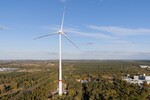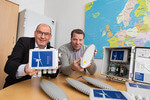News Release from WindEurope
Wind Industry Profile of
07/10/2012
This week: Wind turbines waste much less energy than fossil fuels
Wind energy opponents who say that producing electricity using the power of the wind is not efficient would do well to take a look at a new graphic published on the Guardian’s data blog using UK Government data. ‘Up in smoke: how energy efficient is electricity produced in the UK?’ shows that thermal sources of electricity – gas, coal, nuclear, waste/biomass, oil and other – lose massive amounts of energy as waste heat, compared to almost 0% for renewables.
Gas accounts for 48% of the UK’s electricity supply and, of the 372 Terra-Watt hours of electricity it produces per year, 54% of this is lost as heat. Coal, meanwhile, accounts for 28% producing 297 TWh, loses an even higher proportion – 66%. Nuclear – accounting for 16% of the energy supply with 162 TWh, loses 65% and oil – 3% of the supply with 51 TWh – loses 77%.
Contrast these figures with renewable energy – which all together account for 4% of the UK’s electricity supply producing 14 TWh – they lose less than one percent. So, under this measure, renewable energy is 100% efficient.
Wind energy opponents centre their arguments on the ‘capacity factor’ of a wind farm. The capacity factor of any power plant is a measure of the amount of energy it actually generates compared to its theoretical maximum output in a given time. No power plant operates at 100% of its capacity.
Wind farms do not operate at wind speeds of less than 4 metres per second, and they are shut down to prevent damage during gale force winds of 25 metres/second or more, or for maintenance. But conventional power stations also do not operate all the time – they stop generating electricity during maintenance or breakdowns.
Comparing the outputs of both sources does show that conventional power stations produce power at a level compared to their theoretical maximum that is currently higher than the level for wind energy. Wind power’s capacity factor is around 30% onshore and 40% offshore, increasing year on year as more wind turbines come online and technology improves. Meanwhile, data from the German Association of Energy and Water Industries (Bundesverband der Energie und Wasserwirtschaft) shows that fossil fuels are often below 50%, even in winter.
RenewableUK, the national industry body, says that the UK has one of the best wind regimes in the world and wind turbines have considerably higher capacity factors than many of the European countries where wind already makes a significant contribution to electricity supplies. Denmark, for example, has a wind farm capacity factor of 24% and yet wind power ‘fuels’ over a quarter of its electricity supply.
Gas accounts for 48% of the UK’s electricity supply and, of the 372 Terra-Watt hours of electricity it produces per year, 54% of this is lost as heat. Coal, meanwhile, accounts for 28% producing 297 TWh, loses an even higher proportion – 66%. Nuclear – accounting for 16% of the energy supply with 162 TWh, loses 65% and oil – 3% of the supply with 51 TWh – loses 77%.
Contrast these figures with renewable energy – which all together account for 4% of the UK’s electricity supply producing 14 TWh – they lose less than one percent. So, under this measure, renewable energy is 100% efficient.
Wind energy opponents centre their arguments on the ‘capacity factor’ of a wind farm. The capacity factor of any power plant is a measure of the amount of energy it actually generates compared to its theoretical maximum output in a given time. No power plant operates at 100% of its capacity.
Wind farms do not operate at wind speeds of less than 4 metres per second, and they are shut down to prevent damage during gale force winds of 25 metres/second or more, or for maintenance. But conventional power stations also do not operate all the time – they stop generating electricity during maintenance or breakdowns.
Comparing the outputs of both sources does show that conventional power stations produce power at a level compared to their theoretical maximum that is currently higher than the level for wind energy. Wind power’s capacity factor is around 30% onshore and 40% offshore, increasing year on year as more wind turbines come online and technology improves. Meanwhile, data from the German Association of Energy and Water Industries (Bundesverband der Energie und Wasserwirtschaft) shows that fossil fuels are often below 50%, even in winter.
RenewableUK, the national industry body, says that the UK has one of the best wind regimes in the world and wind turbines have considerably higher capacity factors than many of the European countries where wind already makes a significant contribution to electricity supplies. Denmark, for example, has a wind farm capacity factor of 24% and yet wind power ‘fuels’ over a quarter of its electricity supply.
- Source:
- European Wind Energy Association
- Author:
- Posted by Trevor Sievert, Online Editorial Journalist / Zoë Casey, http://blog.ewea.org/
- Email:
- ewea@ewea.org
- Link:
- www.ewea.org/...
- Keywords:
- wind, wind energy, wind turbine, rotorblade, awea, ewea, wind power, suppliers, manufacturerstrevor sievert
























